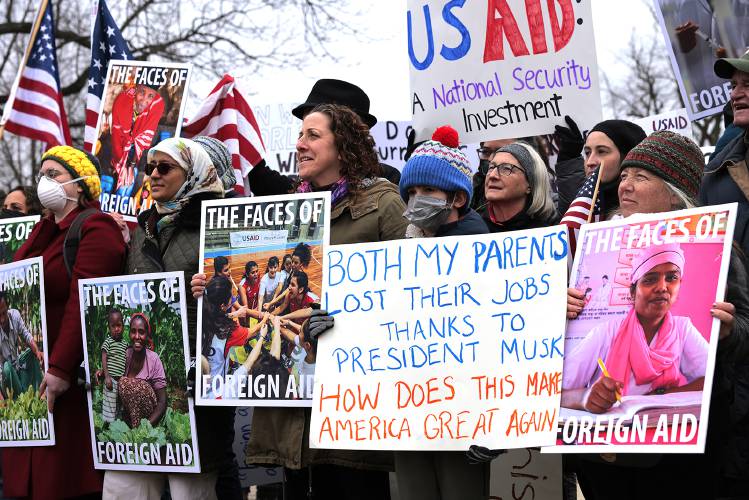My Turn: This is not who we are

Current and former employees of the U.S. Agency for International Development (USAID) and their supporters rally with members of Congress outside the U.S. Capitol on Feb. 5, 2025, in Washington, D.C. Hundreds protested against the Trump Administration’s sudden closure of agency resulting in the canceling of all aid work, conflict prevention and foreign policy work around the world and the possible dismissal of thousands of employees. CHIP SOMODEVILLA/GETTY IMAGES/TNS
| Published: 05-01-2025 1:20 PM |
In the three months since President Trump took office, we have seen an unprecedented upheaval of the norms and principles that are foundational to who we are as a nation and a people. Of the myriad devastating impacts resulting from the chaotic behavior of the current Administration, the effort to disparage, dismantle and defund the institutions of America’s international leadership and engagement is most strikingly at odds with America’s fundamental values and what it has long stood for — a reliable partner, a country of opportunity and hope, and a beacon to those seeking a better life.
With over 40 years of experience, first serving as a Peace Corps volunteer, working for the U.S. Congress, followed by 25 years working for USAID and the Department of State, and most recently leading non-governmental organizations, I can personally attest to the vital role and long-term value of our international engagement to the United States.
Far from promoting any “radical ideological agendas,” the dedicated civil and foreign service officers, nonprofit organizations and volunteers are working to promote the interests and values of the U.S., and support equitable and sustainable development for the global common good.
The United States has long been an international leader in many spheres including technical innovation, medical and scientific research, business and finance, international conflict resolution and peace efforts, among others. U.S. leadership in rallying NATO and other like-minded countries to support Ukraine to defend itself against Russian aggression or guiding the Paris Climate Accord to a successful end in 2015, are only a few examples of the importance of American leadership.
Looking further back, the prescient and enormously successful Marshall Plan to rebuild Europe after the end of World War II, is another historic example of leadership — and emblematic of what truly makes America great. The strategic relationships and trust built up through the many dimensions of “soft power” over decades have strengthened national security and prosperity, and helped make the U.S. the global powerhouse it is today.
The Fulbright Scholarship program which supports educational exchange between the U.S. and other countries is one effective example of the how the United States has long attracted the best and brightest to our universities, businesses, and nation, contributing hugely to America’s preeminence in so many areas today. Of the many notable individuals who were Fulbright scholars in the U.S, 42 alumni are serving or have served as head of state, and 64 Fulbright alumni have won the Nobel Prize. Sadly, today foreign students across the U.S. are living in terror of being deported or having their visas revoked.
People of all political stripes agree on the need to improve government efficiency and effectiveness, which has been actively pursued by past administrations. However, the reckless approach of taking a sledgehammer to the entire federal government and key institutions, aggressively threatening close allies and adversaries alike, is leading us in exactly the wrong direction. Not only is it wreaking havoc and chaos across agencies and services within the U.S., endangering critical government functions, but it is alienating the U.S. worldwide. Indeed, recent polls by Fox, Pew and others indicate most Americans do not support these policies by wide margins.
To be sure, there have been many missteps and mistakes in U.S. international engagement, such as the disastrous wars in Vietnam and Iraq, but overall, America has largely played a positive and important role, reflecting America’s core values.
Article continues after...
Yesterday's Most Read Articles
 Green River Festival brings ‘cultural melting pot’ of music to fairgrounds
Green River Festival brings ‘cultural melting pot’ of music to fairgrounds
 With a little help from his community: Northfield Mount Hermon teacher fighting rare form of cancer begins clinical trial
With a little help from his community: Northfield Mount Hermon teacher fighting rare form of cancer begins clinical trial
 Small group, big impact: Volunteers form community in Greenfield while removing invasive plants
Small group, big impact: Volunteers form community in Greenfield while removing invasive plants
 PHOTOS: Green River Festival wraps up 39th year
PHOTOS: Green River Festival wraps up 39th year
 Montague Police Logs: May 18 to May 26, 2025
Montague Police Logs: May 18 to May 26, 2025
 UMass climate scientists reeling as Trump administration slashes funding for research
UMass climate scientists reeling as Trump administration slashes funding for research
Americans should rightly be proud of the having long been the global leader in providing critical humanitarian assistance to people in need, those suffering from famines, natural disasters, and wars, even in countries we were at odds with. In Ukraine alone, USAID reached over 16 million citizens with emergency food and shelter, safe drinking water, and leveraged U.S. resources to raise three times as much from other donors.
Our foreign assistance budget has always been a tiny fraction – less than 1% - of the federal budget, but it has had an enormous, outsize impact and benefit to the U.S.: combating Ebola to prevent its spread to the U.S,, strengthening countries health systems to prevent future pandemics spiraling out of control, promoting anti-corruption in countries to allow U.S. business an even playing field, supporting sustainable economic livelihoods to prevent migrant flows and alternatives to drug production, are only a few examples. As in so many spheres, prevention always proves cheaper and more effective than responding to crises after they erupted.
The recent rash of actions to sharply diminish our international engagement and assistance are enormous strategic blunders with far reaching consequences. The dismantling of USAID — which has enjoyed tremendous bipartisan support in the six decades since it was created by President John F. Kennedy — has cut off life-saving programs and left thousands vulnerable to disease and famine. Closing the U.S. Institute for Peace, going after the Peace Corps, and the recent “reorganization” of the State Department (including notably eliminating the Bureau for Democracy, Human Rights and Labor) will all leave the U.S. weaker, isolated, and more vulnerable to a wide range of threats, severely undermining our global leadership and national security. As expected, China is happily stepping into the void we leave behind.
Not surprisingly, in response to the current upheaval and turmoil here, former friends and allies increasingly view America as a rogue, unstable state that cannot be trusted. Decades of U.S. international leadership, skillful diplomacy and generous foreign assistance have built relationships and trust over many decades that are now being recklessly squandered. These relationships cannot easily, or possibly ever, be rebuilt.
For better or worse, as Covid, climate change, and the integrated global economic system have made it clear, we are interconnected and cannot wall ourselves off from the rest of the world. The scope of current challenges — a looming recession, financial and political turmoil, climate change, epidemics, the use of AI, among others — makes it all the more important to stand strong in our core values and commitment to America’s continued international engagement and leadership. Given the magnitude of these issues, working cooperatively with international partners is not optional, it is essential.
Polly Byers recently stepped down as executive director of the Karuna Center for Peacebuilding, a 30-year international peacebuilding organization based in Greenfield.






 Columnist Judy Wagner: The songs of summer
Columnist Judy Wagner: The songs of summer Guest columnist Rob Moir: For cod and country
Guest columnist Rob Moir: For cod and country Marguerite Willis: Lessons aplenty in sports article
Marguerite Willis: Lessons aplenty in sports article Maia Hinesley-Saunders: The Skrmetti decision, Dobbs, and solidarity with the reproductive justice movement
Maia Hinesley-Saunders: The Skrmetti decision, Dobbs, and solidarity with the reproductive justice movement
